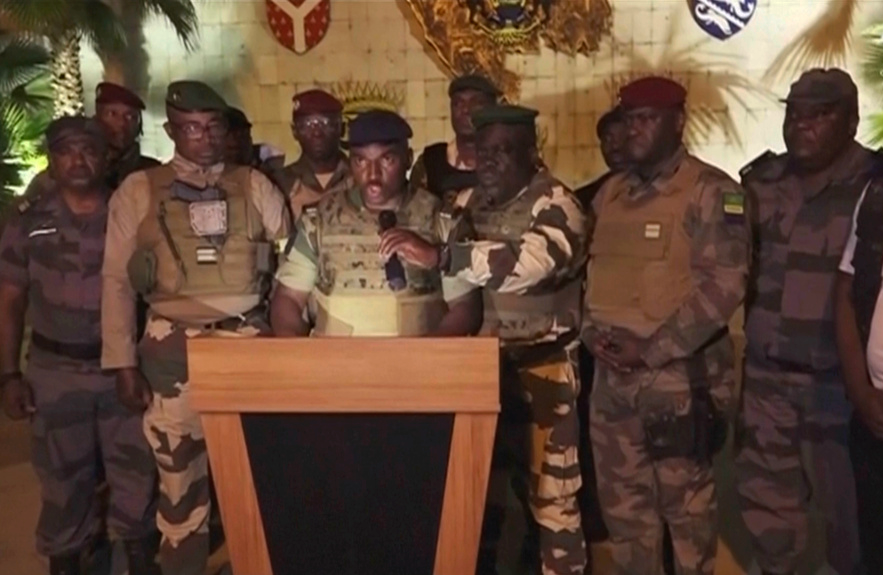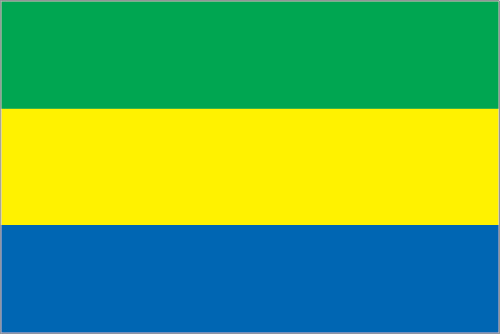« Previous: Togo (February 15)
Next: Malawi (September 16) »
Presidential and Legislative Elections
April 12
The Gabon presidential election is shaping up to be a highly orchestrated exercise aimed at conferring a degree of legitimacy on the military regime of Brigadier General Brice Oligui Nguema who seized power in a coup on August 30, 2023.
Gabon is on track to swap one form of autocratic governance with another.
Oligui has followed a carefully choreographed sequence of actions to pave an unobstructed pathway to claim the presidency in this resource-rich country of 2.5 million people within the vital Congo Basin region. This includes declaring himself Transition President on September 4, 2023, appointing loyalists to two-thirds of the Senate and National Assembly, naming all 9 members of the Constitutional Court, and hosting a tightly scripted national dialogue in mid-2024, from which 200 political parties were banned and in which the military played a prominent role.
An outcome of the proceedings was the rewriting of the constitution to allow members of the military to contest political office, remove the role of the prime minister, extend presidential terms to seven years, and abolish the two round electoral system (thus lowering the threshold of popular support needed), transfer of responsibility for overseeing the elections from the electoral commission to the Ministry of Interior, and adopt a strict electoral code to limit potential presidential candidates.
Each of these changes further consolidates authority within Gabon’s already highly centralized executive branch while also providing Oligui a glide path to extend his hold on power. These changes were subsequently validated in a perfunctory constitutional referendum in November 2024.

Gabon Republican Guard seizes power in 2023. (Photo: screenshot from “Pressure Mounts on Gabon Junta to Relinquish Power After Coup”)
On March 4, 2025, Oligui announced his candidacy for president as an independent candidate.
Oligui appears to be replicating the coup transition playbook of General Mahamat Déby of Chad who ignored the constitutionally mandated succession process to seize power in April 2021, declare himself president of the transition, host a stage-managed national dialogue, and hold a flawed constitutional referendum that opened the door for him to declare victory in a predictable presidential election in May 2024.
Oligui has cultivated the image of a reformer playing off the popular revulsion toward the profligacy and repression of the government of Ali Bongo and the Bongo family dynasty that had ruled Gabon for 56 years. This obscures the reality that Oligui has been a longtime confidant of the Bongo family. He is a cousin of Ali Bongo and served as aide-de-camp to Omar Bongo until his death in 2009. He was head of intelligence services for the Republican Guard before being appointed by Ali Bongo to lead the Guard in 2020. The force size and budget of the Republican Guard grew significantly under Oligui—providing him the platform from which to launch his coup. Oligui is likewise reported to have accumulated considerable wealth from his close ties to the Bongos.
Oligui has cultivated the image of a reformer but he has been a longtime confidant of the Bongo family.
Oligui, thus, is in many ways a continuation rather than a departure from the Bongo dynasty. His extraconstitutional seizure of power is also a warning of the risks of a politicized military that becomes so integral to keeping an autocratic regime in power that the barriers to the military taking the final step of assuming power itself becomes increasingly extraneous.
Overlooked in the coup and the subsequent managed transition is that there is an organized civilian opposition that has been vigorously contesting recent elections in Gabon despite the lopsided playing field. An opposition coalition, Alternance 2023, led by former university professor Albert Ondo Ossa, promoted a reform agenda for Gabon during the 2023 elections aimed at redressing the patronage-driven inequity that has characterized the country and has resulted in an estimated 40 percent of youth unemployment despite Gabon’s oil wealth and $9,000 per capita income (one of the highest in Africa).

An election official burns ballots after the counting has finished at a voting station in Libreville on November 16, 2024. (Photo: AFP/Nao Mukadi)
Ossa is widely believed to have won the 2023 elections despite widespread irregularities, the absence of international monitors, the arrests of local election monitors, and an internet ban in the final month of the campaign. Official results reported Ossa earning 31 percent of the vote to Ali Bongo’s 64 percent. The incredulity of Bongo’s claim of victory provided the backdrop for Oligui’s coup. Rather than calling for an independent review of the vote count to acknowledge the rightful winner, however, Oligui moved to have himself installed as transitional president.
Overlooked in the coup and the subsequent managed transition is that there is an organized civilian opposition.
Opposition leaders have subsequently challenged Oligui’s authority to rewrite the constitution and electoral code that enables his pathway to the presidency in 2025.
Despite the unlevel playing field, 22 opposition leaders submitted their candidacies to the Ministry of Interior. Only seven of these were accepted, however. Opposition candidates with the most name recognition, like Albert Ossa and Pierre Moussavou, were barred from contesting due to the age limit (of 70 years) inserted in the new electoral code. Others were prohibited from running due to inadequate parental citizenship and marriage certificate documentation.
Among the candidates deemed eligible, Alain-Claude Bilie-By-Nze, a former Prime Minister and head of the Gabonese Democratic Party, is regarded as the most formidable opponent. Over the past year, Bilie-By-Nze has positioned himself as a critic of the transitional government, voicing concerns about the former ruling party, the military regime’s revision of the constitution, and the lack of representation in the national dialogue process. Iloko Boussengui Stéphane Germain, a former ally of Bilie-By-Nze, will also contest in the election, sparking speculation of a possible deal with the military regime as a means to dilute the opposition vote count in the single round, first-past-the-post election.
To further stifle dissent, any criticisms that the military is exploiting the transition process for its political gain are branded by state-run media as antipatriotic
Other opposition parties, including the former ruling party and the National Union Party, have either assumed leadership roles or endorsed Oligui.
Given the legacy of vote rigging in Gabon and the tightly structured post-coup transition, prospects of a free and fair process are dim. To further stifle dissent, any criticisms that the military is exploiting the transition process for its political gain are branded by state-run media as antipatriotic and undermining of national unity. Oligui has also used military recruitment to build support, announcing in December 2024 that thousands of youth would be recruited into the armed forces.
Listening for the preferences of the muffled civil society voices who have been the champions for democratic reform in Gabon over the years may be the most illuminating aspect of an otherwise foreseeable electoral process that is on track to swap one form of autocratic governance with another.
Hany Wahila is a Research Assistant with the Africa Center for Strategic Studies.
Previous
« Togo (February 15)
Next
Malawi (September 16) »


 Gabon: Junta Navigating Glide Path to Consolidate Power
Gabon: Junta Navigating Glide Path to Consolidate Power